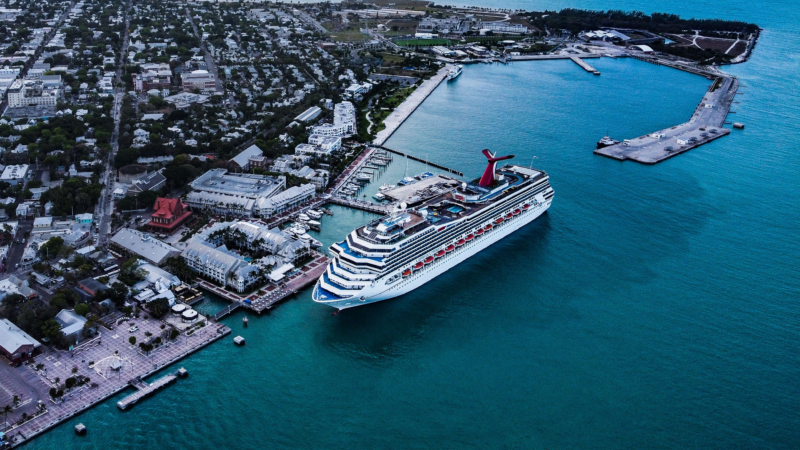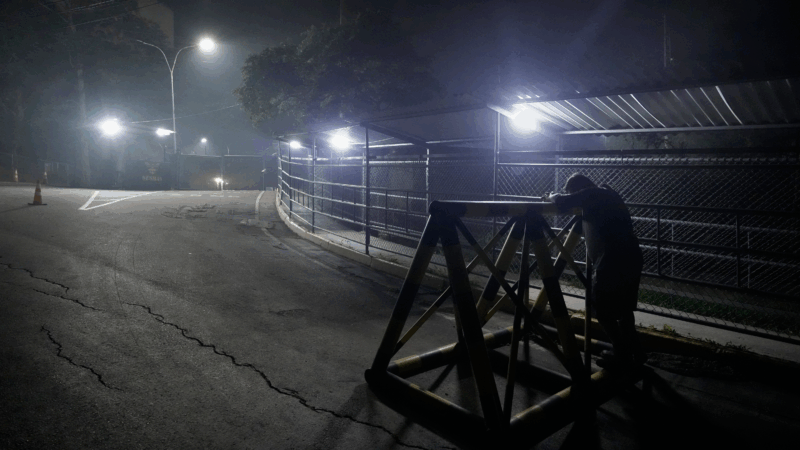In Key West, testing shows cruise ships stir up as much sediment as a hurricane
KEY WEST, Fla. — On a warm and sunny February day here in Florida’s historic resort, people stream off the Celebrity Constellation, a cruise ship with more than 2,000 passengers. The ship towers over the dock and surrounding shops.
Not far away, there’s a device in the harbor that has been keeping track of the area’s water quality for more than a year.
Arlo Haskell, with the Key West Committee for Safer Cleaner Ships, says, “There are two sensors down there, one relatively close to the surface and a second relatively close to the bottom picking up environmental readings of dozens and dozens of different substances and scientific parameters.”
Key West has an uneasy relationship with the cruise ships that call on the island almost daily. Five years ago, the city tried to ban them but was overruled by the state. Under an agreement negotiated afterwards with the private owner of the cruise pier, one ship per day now can call on Key West. At the same time, the city adopted a law requiring it to monitor the water quality in the cruise port.
Haskell says a key issue is something called turbidity — how much mud and fine sediment is stirred up when cruise ships enter the harbor. He says, “You have these very large vessels with their keels very close to the bottom. And what you see is giant clouds of sedimentation, of silt.”

In Key West, a local school, College of the Florida Keys, said it was willing to run the city’s water quality tests. But at a city commission meeting in November, marine researcher Patrick Rice had some bad news for local officials.
Tests showed more than 30 occasions where turbidity stirred up by cruise ships exceeded limits set by the EPA. Rice showed commissioners a graph with data from the cruise port. He said, “What you can see is, on this particular day, one cruise ship had two turbidity events associated with it that exceeded EPA standards by more than three times.”
Rice said the monitors also recorded occasions where turbidity readings exceeded federal standards when hurricanes passed through. “There’s 32 events that exceed those turbidity standards over the past year,” he said. “So, it’s like having 32 hurricanes, basically.”
Captain Will Benson is a fishing guide who cares a lot about water quality in the Keys. He says, “The turbidity…comes up and gets washed around the island and it makes our waters less clear. It has an impact on seagrasses. [It] has an impact on hard-bottom communities and it has an impact on the coral reef.”
In the cruise port, studies have shown, despite being located in an active waterway, marine life including coral have remained relatively healthy. Elsewhere in the Keys, worsening water quality has been identified as one of the factors responsible for a decline in bonefish and tarpon, and the devastation of Florida’s coral reefs.

Benson was disappointed with how Key West’s commissioners responded to the water quality tests. Commissioners were particularly concerned about testing for turbidity, which raised a red flag about the impact of cruise ships. They eventually voted not to renew the College’s water quality contract testing for the city. And the commission voted to require the College to remove its equipment from city property.
Commissioner Lissette Carey was one of those questioning the College’s focus on turbidity, which she suggested served the goals of those who are opposed to the large cruise ships. She said, “I believe the responsible thing to do is to make sure we broaden the scope of our testing to make sure we’re not serving any one group in particular.”
To comply with the law, the commission has begun looking for another organization or company to conduct water testing, a process likely to take several months or more.
In the meantime, city-sponsored tests have been suspended while cruise ships come and go almost daily. Key West Mayor Dee-Dee Henriquez didn’t respond to interview requests. But on Key West radio station US1 she said officials aren’t putting politics over the environment. “We are fully transparent,” she said. “We have nothing to hide. And we remain committed to ensuring water quality for our community. “

Key West Commissioner Sam Kaufman tried to convince other commissioners to renew the city’s agreement with College of the Keys or at least allow researchers to leave their equipment in the harbor. He was unsuccessful but says this is an issue that locals and visitors care about. He says, “We’re a tourist destination and our lifeblood is the water. People come here to dive the reef. People come here to fish. People come here just to look at the beauty of our environment.”
Kaufman says College of the Florida Keys has funding from the federal government and is likely to continue its work monitoring water quality with or without the city’s cooperation. If the city does find a replacement he’s hoping in the end Key West may end up with more, not less data on the island’s water.
Yemen’s Southern Transitional Council says it will dissolve after its head fled to UAE
Yemen's Southern Transitional Council and its institutions will be dismantled after weeks of unrest in southern areas and a day after its leader fled to the United Arab Emirates.
National Park Service will void passes with stickers over Trump’s face
The use of an image of Trump on the 2026 pass — rather than the usual picture of nature — has sparked a backlash, sticker protests, and a lawsuit from a conservation group.
Hiring slows in December to end the weakest year of job growth since the pandemic
U.S. employers added 50,000 jobs in December, according to a report from the Labor Department Friday. Measured annually, job gains in 2025 were the slowest since 2020.
Venezuela releases imprisoned opposition figures, which Trump says U.S. requested
Venezuela released a number of imprisoned high-profile opposition figures, activists and journalists, in what the government described as a gesture to "seek peace".
In ‘No Other Choice,’ a loyal worker gets the ax — and starts chopping
In the latest movie from Park Chan-wook, the director behind The Handmaiden and Decision to Leave, a paper factory worker loses his job — and resolves to kill his competition for a new one.
Maduro is out, Congress is in and the quiz is back! Start 2026 with a perfect score
Plus: What's up with Wicked, Greenland, quarters and Jan. 6?







